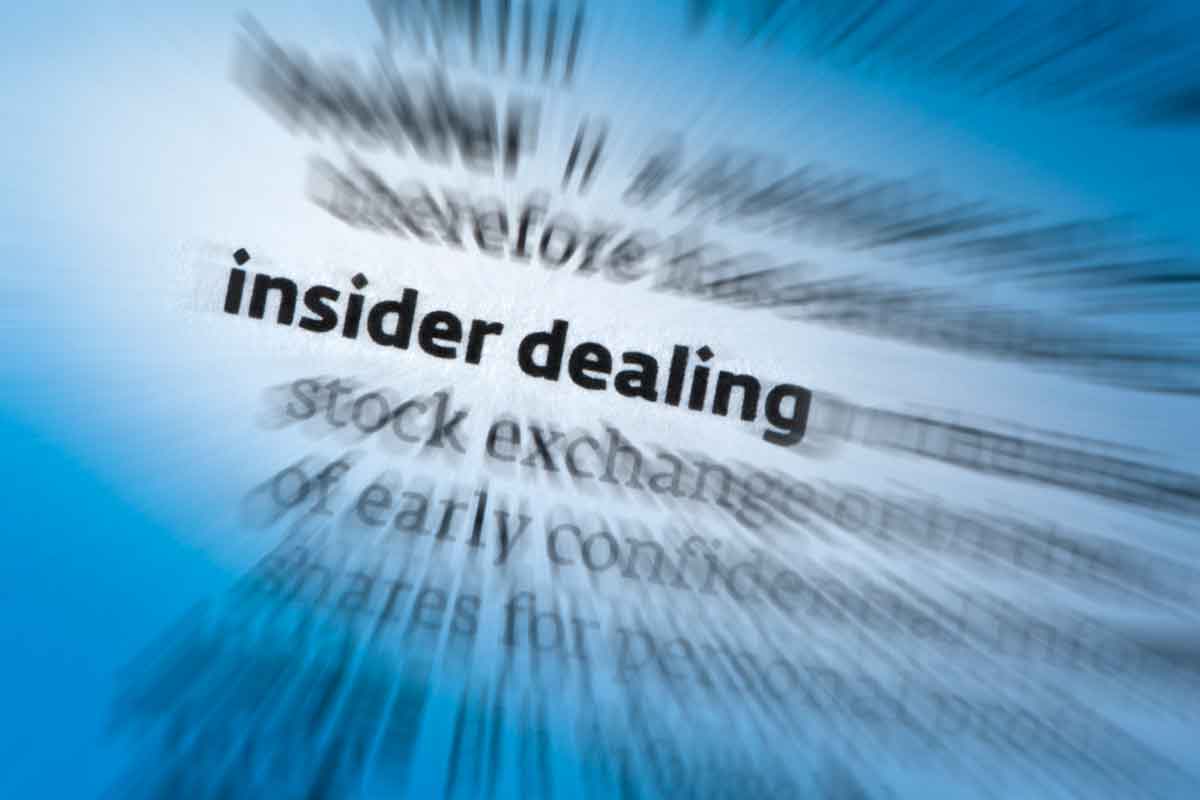The Market Abuse Regulation clearly defines and regulates all facets of insider dealing (or insider trading) to protect financial markets from corruption. Standardising the identification, treatment, and regulation of insider dealing, MAR aims to prevent all individuals and organizations from market manipulation via inside information.
Outlining compliance best practices and insider dealing sanctions, MAR explicitly details the processes and procedures that institutions must follow to disclose inside information. Otherwise, significant financial and administrative penalties may be imposed by the National Competent Authority.
It is vital to recognize the extensive list of market abuse behaviours that MAR regulates under the umbrella term “insider trading”.
Whether insider dealing occurs intentionally or not, it’s still highly illegal. If your organization fails to implement the correct insider dealing policies and procedures due to ignorance, you still face the same harsh sanctions.
So how do you avoid insider dealing altogether to keep compliant with MAR?
Read to the end of this article to find out:
- What is insider trading?
- How does MAR regulate insider trading?
- The insider trading penalties and sanctions
- A list of insider trading cases and examples
1. What is insider dealing (insider trading)?
According to MAR, the legal definition of insider dealing is as follows:
For the purposes of this Regulation, insider dealing arises where a person possesses inside information and uses that information by acquiring or disposing of, for its own account or for the account of a third party, directly or indirectly, financial instruments to which that information relates. The use of inside information by cancelling or amending an order concerning a financial instrument to which the information relates where the order was placed before the person concerned possessed the inside information, shall also be considered to be insider dealing. In relation to auctions of emission allowances or other auctioned products based thereon that are held pursuant to Regulation (EU) No 1031/2010, the use of inside information shall also comprise submitting, modifying or withdrawing a bid by a person for its own account or for the account of a third party. (MAR Article 8(1))
Insider dealing is considered to be any activity where a person acquires, disposes of, changes, or cancels a financial instrument based on inside information.
Be aware that this also includes the act of soliciting a third-party to arrange deals through intermediary accounts.
Recommending that another person engages in insider dealing also carries a high penalty. Any person caught colluding with a third-party to adjust, cancel, terminate, or execute deals based on inside information is subject to sanctions, as well.
Insider trading exampleAn ex-Goldman Sachs banker acquired access to countless pieces of inside information while working for the financial firm between 2015 and 2017. Using inside information pertaining to pending corporate acquisitions, the banker made early investments in Switzerland, resulting in considerable financial gains. The banker was ordered to pay $260,000 and has been sentenced to 12 months house detention.
2. Is insider dealing illegal?
In short, yes.
In the EU and the UK, insider dealing is highly illegal and subject to strict repercussions from financial authorities.
As noted above, market abuse behaviours of this kind will be met with harsh punishment, including unlimited fines and long custodial sentences.
2.1 But why is insider trading illegal?
The reason why insider trading is illegal is that it simply gives certain individuals an unfair advantage due to the fact that they have access to inside information that is not available to other traders on the market. For example, if the insider is aware of a potential up or down tick in a company’s stock trading value, they may decide to buy or sell before others and thus turn a profit.
More importantly, however, insider trading skews the market, causing prices to fluctuate and markets to become unstable. To avoid volatility in the financial markets, insider trading must be stamped out.
Types of insider dealing per MAR
There are four types of insider dealing:
- Acquiring or disposing of financial instruments based on inside information
- Amending or cancelling orders based on this inside information
- Soliciting a third-party to acquire or dispose of financial instruments based on this inside information
- Soliciting a third-party to amend or cancel orders based on this inside information
Insider dealing is punished with criminal sanctions.
Insider Trading Sanctions Example
In Spain, an insider dealer who has obtained €600,000 or more can be prosecuted through criminal or administrative proceedings. Penalties include high fines and imprisonment of up to six years
3. What is inside information?
MAR defines inside information as follows:
- Information of a specific nature that hasn’t been made public information yet. This information relates to one or more financial instruments and would have a notable effect on the prices of these instruments and derivatives.
- Information of the same nature relating to commodity derivatives.
- Information of the same nature relating to emission allowances and related auctioned products.
- (Relating to persons who execute orders on behalf of clients) Information relayed by a client or pertaining to a client’s pending order, which would significantly affect the price.
3.1 What is delayed disclosure of inside information?
An issuer or emission allowance market (EAM) participant is permitted to delay disclosure of inside information to the public.
However, this delay process must meet all of the following conditions, as according to MAR:
- immediate disclosure is likely to prejudice the legitimate interests of the issuer or emission allowance market participant;
- delay of disclosure is not likely to mislead the public;
- the issuer or emission allowance market participant is able to ensure the confidentiality of that information. (MAR Article 17(4))
To meet compliance standards, issuers and EAM participants must inform the relevant financial authority that the information was delayed, immediately upon its disclosure to the public.
3.2 The decision to delay disclosure
This decision must be formalised, documented and saved in case the supervisory authority requests it later. It must include the date when the decision for delay was made, the person responsible for the decision as well as the specific circumstances that prove all of the above conditions were met.
3.3 Managing inside information: Insider lists
3.3.1 What is an Insider List?
Insider lists are a regulated requirement of MAR.
Issuers and EAM participants must create an insider list of all individuals with access to inside information.
MAR provides explicit guidance on how to do this.
Issuers or any person acting on their behalf or on their account, shall: draw up a list of all persons who have access to inside information and who are working for them under a contract of employment, or otherwise performing tasks through which they have access to inside information, such as advisers, accountants or credit rating agencies (insider list);
promptly update the insider list in accordance with paragraph 4; and
provide the insider list to the competent authority as soon as possible upon its request. (MAR Article 18(1))
provide the insider list to the competent authority as soon as possible upon its request. (MAR Article 18(1))
This insider list should provide details pertaining to the person’s role, the inside information they know, and the time period that this inside information is relevant.
It is possible for an insider list to have sections for both permanent insiders and persons with temporary access to inside information. However, the permanent section must be used with great care and must be limited only to individuals who truly have access to inside information at all times. As ESMA’s Consultation Paper clearly states,
“In ESMA’s view, only an extremely limited group of individuals should meet that definition, including the Chief Executive Officer, in certain specific cases, the Chief Finance Officer, Executive Assistant, Chairman of the Board, Head of Legal Department/Compliance Officer and Chief Technical Officers.”
The Commission Implementing Regulation (EU) 2016/347 of 10 March 2016 specifies the exact technical standard for storing an insider list. The following information must be present for each insider listed:
- The person’s full name (including birth surname if different)
- Personal identification number (if applicable)
- Professional & personal telephone number
- Company name and address
- Personal address
- The reason the person is included on the insider list
- The time and date that the person gained access to this piece of inside information
- The time and date that the person ceased to have access to this piece of inside information (updated when information is no longer deemed inside information)
The insider list must be updated as soon as possible when there is a change in circumstances. Alterations must include information pertinent to the change. For example, the most common reason for an update is adding additional insiders to the list.
Previous versions of the insider list must be kept for 5 years in case they are requested by the financial regulator.
3.3.2 How do insider lists help prevent insider dealing?
Financial authorities use insider lists to map the flow of inside information. This helps them to identify the individuals with access to specific pieces of inside information and therefore determine if these individuals were able to do insider trading.
The competent authority can request an organization’s insider list(s) as evidence. For example, an insider list may be used during an investigation when authorities need to trace connected market abuse behaviours.
3.3.3 What are the penalties for insider dealing as defined by MAR?
There are serious penalties under MAR for those accused of insider trading and market abuse.
Firstly, any person or entity caught insider trading will face the following financial sanctions:
| MAR Article Infringement | Maximum Administrative Pecuniary Sanctions | |
| For a natural person | 14 | up to €5,000,000 in fines |
| For legal persons | 14 | up to €15,000,000 or 15% of the annual turnover from the last available accounts |
In addition, MAR requires member states to ensure that competent authorities have the power to impose at least the following administrative sanctions:
- Disgorgement of profits gained or losses avoided from insider trading
- A public caution
- Suspension from your position and legal authority
- A temporary ban on managerial responsibilities
- A permanent ban for repeated infringements
- Extra fines of up to three times the profits gained or loss avoided from insider trading
3.3.4 Penalties vary by country
While MAR imposes a threshold for insider trading penalties, EU member states can increase these penalties.
In the UK, the implementation of MAR provides for the sanctions mentioned above along with additional measures.
According to the FCA, “Insider dealing is a criminal offence under Part V of the Criminal Justice Act 1993, and criminal market manipulation is an offence under sections 89-91 of the Financial Services Act 2012.”
In the UK, insider trading is punished severely by the Financial Conduct Authority (FCA). For infringement, the FCA imposes order injunctions and unlimited fines, along with professional bans and license revocation.
4. Insider trading examples and cases
Here are three insider trading cases from recent years that show the gravity of financial sanctions and criminal penalties given to those caught insider dealing.
4.1 Capital market company pays €10.5 million insider trading fines
In 2018, a German capital market company was fined €10.5 million for insider trading related to the former Chief Executive.
The company was fined for breaching the insider trading ban and for failing to announce public disclosure in the mandated time period.
4.2 Former bank MD & partners serve 4.5 and 3.5 year prison sentences
Former MD of a German bank and his partner-in-crime were caught executing what the FCA described as its largest and most complex insider dealing case in history.
While the ex-MD would secure insider information from the investment banks he worked with, he would pass this to his partner, who would execute the deals and cover their tracks.
The ex-MD was sentenced to four and a half years, and his partner to three and a half years.
4.3 Politician pays €30,000 insider trading fines
Former Spanish politician was fined €30,000 in 2018 for selling shares in a Spanish energy company where he was a board member at the time.
Fined by the National Securities Market Commission, it was determined that the politician was in serious breach of insider training rules. His insider trading penalties and official warning were published in Spain’s official state bulletin.
5. Accidental insider trading
Ignorance of insider trading legislation is not an excuse. Whether insider dealing is purposeful or accidental, financial regulations impose the same penalties.
So, a casual investment tip could easily result in a criminal sentence or a hefty fine. If you are the person who has divulged inside information, you could be unwittingly insider dealing.
6. Conclusion
The Market Abuse Regulation offers extensive legislative guidance to define and standardise insider information procedures to prevent insider dealing.
MAR sets out a unified framework for all EU members to stay compliant, while declaring the harsh sanctions that will be enforced for insider trading breaches.
Remember that accidental insider trading is also illegal, so keep a keen eye on the investment decisions you make if you hold inside information.
Discourage insider dealing & Ensure MAR complianceInsiderLog helps you maintain electronic insider lists as mandated by MAR. Besides helping you stay compliant, InsiderLog also helps you discourage insider trading as all insiders are aware that they are added to an insider list. Request a demo of InsiderLog today.
7. References & Further Reading
Share this post
Article Summary
- 1. What is insider dealing (insider trading)?
- 2. Is insider dealing illegal?
- 2.1 But why is insider trading illegal?
- 3. What is insider information?
- 3.1 What is delayed disclosure of inside information?
- 3.2 The decision to delay disclosure
- 3.3 Managing inside information: Insider lists
- 3.3.1 What is an Insider List?
- 3.3.2 How do insider lists help prevent insider dealing?
- 3.3.3 What are the penalties for insider dealing as defined by MAR?
- 3.3.4 Penalties vary by country
- 4. Insider trading examples and cases
- 4.1 Capital market company pays €10.5 million insider trading fines
- 4.2 Former bank MD & partners serve 4.5 and 3.5 year prison sentences
- 4.3 Politician pays €30,000 insider trading fines
- 5. Accidental insider trading
- 6. Conclusion
- 7. References & Further Reading





